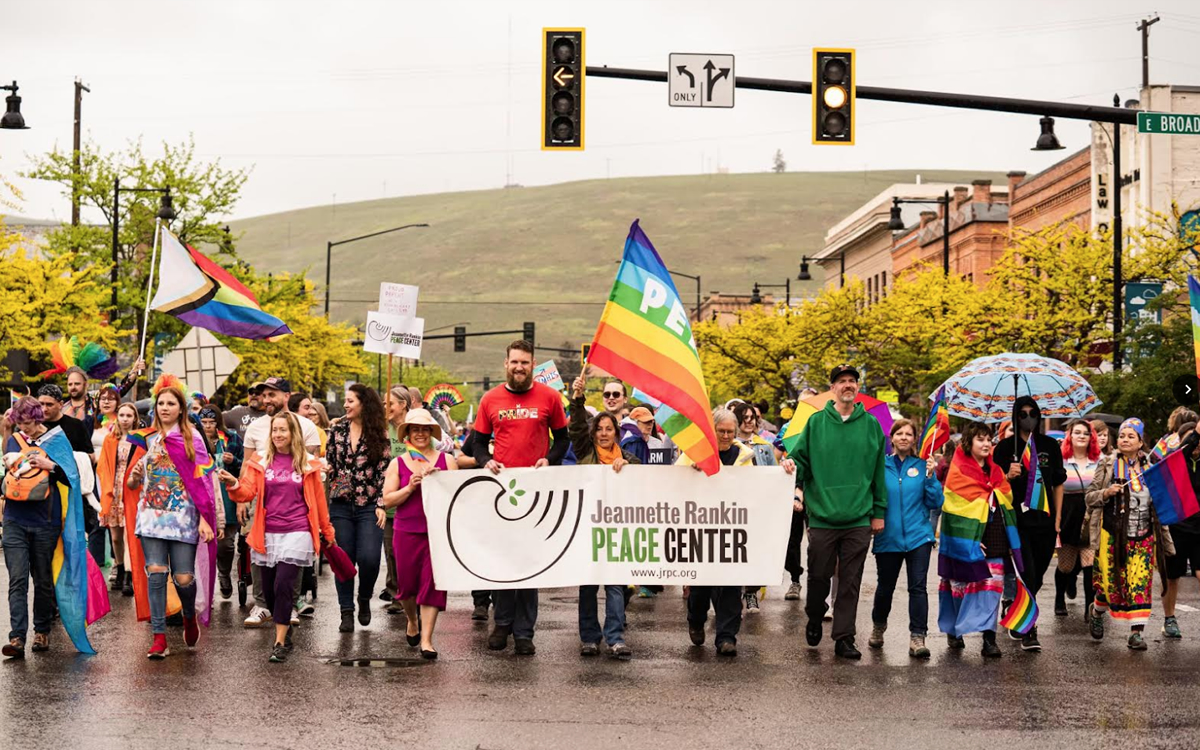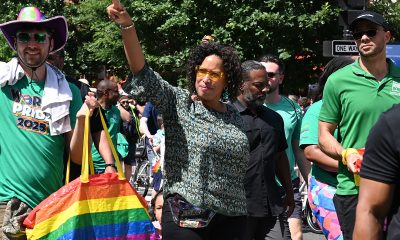National
Groups lobby for political mapmakers to take LGBTQ community into account
More than 70 challenges against district maps have been filed across the country

Redistricting and updated political maps are at the heart of American democracy.
Every 10 years, the U.S. Census Bureau tells lawmakers the demographics of their constituents, and likely, how they’ll vote. Lawmakers then redraw districts, in many cases, along partisan lines to give advantage to a specific party. This process, called gerrymandering, is at the heart of state legislatures across the country, and poses a significant challenge to LGBTQ rights in many states.
Gerrymandering has been at the heart of multiple court challenges since the 2020 election. As of July, 74 cases have been filed challenging district maps in 27 states as racially discriminatory or partisan gerrymanders.
While the conversation around gerrymandering often focuses on race or political affiliation, the LGBTQ community is often left out, despite having massive voting power.
The LGBTQ community has utilized its voting power for a long time, and famously elected Harvey Milk, the U.S.’s first openly gay person to hold public office, to the San Francisco Board of Supervisors in 1977. Since then, the number of openly-LGBTQ politicians is growing, with a record number expected to run in 2024.
Redistricting played a powerful role in Milk’s election. Despite the LGBTQ population making up one fifth of San Francisco’s voters at the time, the city’s at-large electoral system — where council members were elected by the whole city — put LGBTQ neighborhoods at a disadvantage.
Milk and other activists led the fight to change the city’s electoral system to district contests, and in 1977, Milk won his seat on the council.
The LGBTQ+ Victory Fund launched a first-of-its-kind campaign to lobby for redistricting that considers LGBTQ populations in map-drawing. The “We Belong Together” campaign, launched following the 2020 election, has two main focuses: Encourage LGBTQ organizations to lobby to keep LGBTQ areas intact and to gather data showing where LGBTQ communities are located within legislative districts.
“[We worked on] basically how to identify large groupings of LGBTQ people, and then advocate to the decision makers who are doing a lot to say, ‘Hey, this is a community of interest, and you need to make sure that they stick together,’” Victory Fund Vice President of Political Programs Sean Meloy said.
Communities of interest are communities of people that are grouped by a common factor — often race and class — that’s taken into account when redistricting happens. LGBTQ people aren’t classified as a community of interest in many states due to sexual orientation not being part of the census.
“A lot of other demographics are accounted for in the census,” Meloy said. “[The Census Bureau] did a pulse survey recently that asked about LGBTQ people. And that’s a great step in a great direction because every community and demographic has unique vulnerabilities, unique issues that government should understand so that they can help address them because they’re all people that they’re supposed to be working on behalf of.”
The Household Pulse Survey was launched in 2020 and tracks a wide variety of household data including, but not limited to, employment, housing security and access to health care. The survey also tracks sexual orientation and gender identity. According to the Census Bureau’s website, the survey tracks how “emergent issues are impacting households across the country from a social and economic perspective.”
Meloy said that this data collected by the Bureau allows for groups like the Victory Fund to draw maps of “centralized areas where there are same sex married couples.” Using the maps, groups can lobby mapmakers to not “draw a line right through” these communities, dividing up their voting power.
Arizona, California, Colorado, Michigan and Montana are all states where maps are drawn by nonpartisan commissions — as opposed to lawmakers drawing the maps — and are the top targets of LGBTQ outreach going into the 2024 election cycle.
“They have fairer districts, and a lot of those states have districts that actually do respect LGBTQ people as communities of interest, and so you know, we had more LGBTQ led legislators elected in California and in Arizona and in Colorado,” Meloy said.
Other areas, such as New York, Fort Lauderdale, Atlanta and Boise, Idaho, could all see an increase in LGBTQ public officials if LGBTQ voters were taken into account in redistricting, according to Victory Fund.
“We know that once we elect some LGBTQ people, there is a domino effect that people feel they can come out, they can be in office, it breaks that barrier,” Meloy said. “And we’ve seen that in a lot of other places over the last 30 years, but we still have a lot of places that we need to continue breaking down those little barriers.”
Federal Government
UPenn erases Lia Thomas’s records as part of settlement with White House
University agreed to ban trans women from women’s sports teams

In a settlement with the Trump-Vance administration announced on Tuesday, the University of Pennsylvania will ban transgender athletes from competing and erase swimming records set by transgender former student Lia Thomas.
The U.S. Department of Education’s Office for Civil Rights found the university in violation of Title IX, the federal rights law barring sex based discrimination in educational institutions, by “permitting males to compete in women’s intercollegiate athletics and to occupy women-only intimate facilities.”
The statement issued by University of Pennsylvania President J. Larry Jameson highlighted how the law’s interpretation was changed substantially under President Donald Trump’s second term.
“The Department of Education OCR investigated the participation of one transgender athlete on the women’s swimming team three years ago, during the 2021-2022 swim season,” he wrote. “At that time, Penn was in compliance with NCAA eligibility rules and Title IX as then interpreted.”
Jameson continued, “Penn has always followed — and continues to follow — Title IX and the applicable policy of the NCAA regarding transgender athletes. NCAA eligibility rules changed in February 2025 with Executive Orders 14168 and 14201 and Penn will continue to adhere to these new rules.”
Writing that “we acknowledge that some student-athletes were disadvantaged by these rules” in place while Thomas was allowed to compete, the university president added, “We recognize this and will apologize to those who experienced a competitive disadvantage or experienced anxiety because of the policies in effect at the time.”
“Today’s resolution agreement with UPenn is yet another example of the Trump effect in action,” Education Secretary Linda McMahon said in a statement. “Thanks to the leadership of President Trump, UPenn has agreed both to apologize for its past Title IX violations and to ensure that women’s sports are protected at the university for future generations of female athletes.”
Under former President Joe Biden, the department’s Office of Civil Rights sought to protect against anti-LGBTQ discrimination in education, bringing investigations and enforcement actions in cases where school officials might, for example, require trans students to use restrooms and facilities consistent with their birth sex or fail to respond to peer harassment over their gender identity.
Much of the legal reasoning behind the Biden-Harris administration’s positions extended from the 2020 U.S. Supreme Court case Bostock v. Clayton County, which found that sex-based discrimination includes that which is based on sexual orientation or gender identity under Title VII rules covering employment practices.
The Trump-Vance administration last week put the state of California on notice that its trans athlete policies were, or once were, in violation of Title IX, which comes amid the ongoing battle with Maine over the same issue.
New York
Two teens shot steps from Stonewall Inn after NYC Pride parade
One of the victims remains in critical condition

On Sunday night, following the annual NYC Pride March, two girls were shot in Sheridan Square, feet away from the historic Stonewall Inn.
According to an NYPD report, the two girls, aged 16 and 17, were shot around 10:15 p.m. as Pride festivities began to wind down. The 16-year-old was struck in the head and, according to police sources, is said to be in critical condition, while the 17-year-old was said to be in stable condition.
The Washington Blade confirmed with the NYPD the details from the police reports and learned no arrests had been made as of noon Monday.
The shooting took place in the Greenwich Village neighborhood of Manhattan, mere feet away from the most famous gay bar in the city — if not the world — the Stonewall Inn. Earlier that day, hundreds of thousands of people marched down Christopher Street to celebrate 55 years of LGBTQ people standing up for their rights.
In June 1969, after police raided the Stonewall Inn, members of the LGBTQ community pushed back, sparking what became known as the Stonewall riots. Over the course of two days, LGBTQ New Yorkers protested the discriminatory policing of queer spaces across the city and mobilized to speak out — and throw bottles if need be — at officers attempting to suppress their existence.
The following year, LGBTQ people returned to the Stonewall Inn and marched through the same streets where queer New Yorkers had been arrested, marking the first “Gay Pride March” in history and declaring that LGBTQ people were not going anywhere.
New York State Assemblywoman Deborah Glick, whose district includes Greenwich Village, took to social media to comment on the shooting.
“After decades of peaceful Pride celebrations — this year gun fire and two people shot near the Stonewall Inn is a reminder that gun violence is everywhere,” the lesbian lawmaker said on X. “Guns are a problem despite the NRA BS.”
New York
Zohran Mamdani participates in NYC Pride parade
Mayoral candidate has detailed LGBTQ rights platform

Zohran Mamdani, the candidate for mayor of New York City who pulled a surprise victory in the primary contest last week, walked in the city’s Pride parade on Sunday.
The Democratic Socialist and New York State Assembly member published photos on social media with New York Attorney General Letitia James, telling followers it was “a joy to march in NYC Pride with the people’s champ” and to “see so many friends on this gorgeous day.”
“Happy Pride NYC,” he wrote, adding a rainbow emoji.
Mamdani’s platform includes a detailed plan for LGBTQ people who “across the United States are facing an increasingly hostile political environment.”
His campaign website explains: “New York City must be a refuge for LGBTQIA+ people, but private institutions in our own city have already started capitulating to Trump’s assault on trans rights.
“Meanwhile, the cost of living crisis confronting working class people across the city hits the LGBTQIA+ community particularly hard, with higher rates of unemployment and homelessness than the rest of the city.”
“The Mamdani administration will protect LGBTQIA+ New Yorkers by expanding and protecting gender-affirming care citywide, making NYC an LGBTQIA+ sanctuary city, and creating the Office of LGBTQIA+ Affairs.”
-

 District of Columbia5 days ago
District of Columbia5 days agoActivists protest outside Hungarian Embassy in DC
-

 Virginia4 days ago
Virginia4 days agoSpanberger touts equality, reproductive rights in Arlington
-

 Books4 days ago
Books4 days agoTwo new books on dining out LGBTQ-style
-

 Theater4 days ago
Theater4 days ago‘Andy Warhol in Iran’ a charming look at intersection of art, politics












